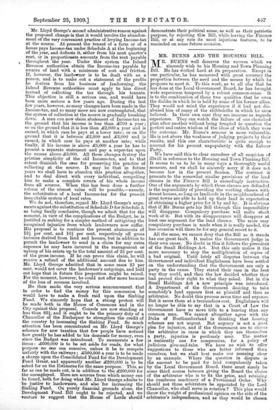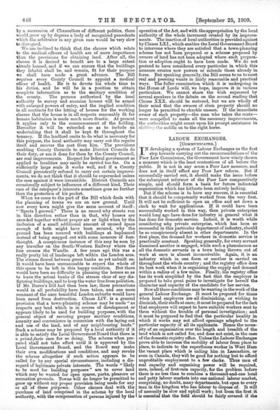MR. BURNS AND THE HOUSING BILL.
MR. BURNS well deserves the success which we sincerely wish to his Housing and Town Planning Bill. He has worked hard at its preparation. Except in one particular, he has measured with great accuracy the proportion between the need and the means by which he proposes to meet it. To this work, as to all else that he has done at the Local Government Board, he has brought wide experience tempered by a robust common-sense. It is to the combination of these two qualities that he owes the dislike in which he is held by some of his former allies. They would not mind the experience if it had not dis- abused him of many of the shibboleths in which ho once believed. In their own case they are immune as regards experience. They can watch the failure of one cherished plan after another without being tempted to question the perfect and entire wisdom of the ideas of which they were the outcome. Mr. Burns's armour is more vulnerable. He is not above the weakness of judging projects by their results, and this one characteristic is quite enough to account for his present unpopularity with the Labour Party.
We have said this to clear ourselves of all suspicion of illwill in reference to the Housing and Town Phinning Bill. It seems to us to be in many ways a thoroughly useful measure, and we shall be sincerely sorry if it does not become law in the present Session. The contrast it presents to the somewhat similar provisions of the land clauses in the Finance Bill is exceedingly instructive. One of the arguments by which those clauses are defended is the impossibility of providing the working classes with decent houses, so long as landlords in the neighbourhood of great towns are able to hold up their land in expectation of obtaining a higher price for it by and by. It is obvious that if Mr. Burns gets his Bill through this impossibility will disappear. Compulsory purchase will make short work of it. But with its disappearance will disappear at least one argument for the land clauses. The more easy compulsory purchase is made when it is really needed, the less occasion will there be for any general resort to it.
All the same, we cannot deny that the Bill as it stands has one great fault. It makes the Government judge in their own cause. No doubt in.this it follows the precedent of the Small Holdings Act. But this only makes it the more necessary to stop the multiplication of copies of a bad original. Until lately all disputes between the Government and individual Englishmen have been settled on the understanding that the Government are only a party in the cause. They stated their case in the best way they could, and then the law decided whether they had proved their right to what they asked. But in the Small Holdings Act a new principle was introduced. A Department of the Government desiring to take somebody's land appears first as plaintiff and then as arbitrator. No doubt this process saves time and expense. But it saves them at a tremendous cost. Englishmen will no longer be able to say that in a Court of Law the.
Government have no more title to a hearing than any common man. We cannot altogether agree with the Duke of Northumberland in thinking that housing schemes are not urgent. But urgency is not a good plea for injustice, and if the Government are to choose the arbitrator in cases in which they are themselves a party, injustice is perilously near. The .matter is eminently one for compromise, for a policy of judicious give-and-take. We have no wish to offer suggestions to those who are better informed than ourselves, but we shall best make our meaning clear by an example. Where the question in dispute is the amount to be paid for land. compulsorily taken by the Local Government Board, there must surely be some third course between giving the Board. the choice of the arbitrator who is to fix the price, and retaining the cumbrous machinery of a Provisional Order. Why should not three arbitrators be appointed. by the Lord Chancellor, who shall serve in rotation ? This plan would. throw the weight of professional opinion on the side of the arbitrator's independence, and as they would be chosen by a succession of Chancellors of different politics, there would grow up by degrees a body of recognised precedents which the arbitrator in any given case would be very slow to disregard. We are inclined to think that the clauses which relate to the medical officers of health are of more importance than the provisions for obtaining land. After all, the classes it is desired to benefit are to a large extent already housed, and if we can ensure that the buildings they inhabit shall be, and remain, fit for their purpose we shall have made a great advance. The Bill requires every County Council to appoint a medical officer of health. He is to devote his whole time to his duties, and he will be in a position to obtain complete information as to the sanitary condition of the county. The persons authorised by the local authority to survey and examine houses will be armed with enlarged powers of entry, and the implied condition in all contracts for the letting of houses for the working classes that the house is in all respects reasonably fit for human habitation is made much more drastic. At present it applies only to the commencement of the holding. Hereafter it will be extended so as to include an undertaking that it shall be kept fit throughout the tenancy. If the landlord omits to do what is necessary for this purpose, the local authority may carry out the repairs itself and recover the cost from him. The provisions enabling County Councils to make District Councils do their duty, or see it done for them by the County Council, are real improvements. Respect for federal government as applied to localities may easily be carried too far. On a sufficiently large scale it works well, and if a County Council persistently refused to carry out certain improve- ments, we do not think that it should be superseded unless the case against it were irresistible. District Councils are occasionally subject to influences of a different kind. Their care of the ratepayer's interests sometimes goes no further than the protection of his pocket. When we come to the part of the Bill which deals with the planning of towns we are on new ground. Until now every town might give the same account of itself : " 'Spects I growed." There is no record why streets run in this direction rather than in that, why houses are crowded together without proper air or light when by the inclusion of a small additional amount of unused space enough of both might have been secured, why the ground has been covered with buildings at haphazard instead of being mapped out with some measure of fore- thought. A conspicuous instance of this may be seen by any traveller on the South-Western Railway where the line crosses the Wandle. A few years ago this was a really pretty bit of landscape left within the London area. The stream flowed between green banks as yet unbuilt on. It would have been unreasonable to expect the whole of this space to be left in this happy condition. But there would have been no difficulty in planning the houses so as to leave the actual banks of the stream clear of any dis- figuring buildings, and to keep the water free from pollution. If Mr. Burns's Bill bad then been law, these precautions would in all probability have been taken, and one more remnant of the once beautiful London suburbs would have been saved from destruction. Clause LIP. is a general provision that a town-planning scheme may be made " as respects any land which is in course of development or appears likely to be used for building purposes, with the general object of securing proper sanitary conditions, amenity and convenience in connexion with the laying out and use of the land, and of any neighbouring lands." Such a scheme may be prepared by a local authority if it is able to satisfy the Local Government Board that there is a prinuf-facie case for so doing. The scheme when pre- r:ca,led shall not take effect until it is approved by the Government Board, and the Board may make their own modifications and conditions, and may revoke the scheme altogether if such action appears to be called for by any special circumstances, including a dis- regard of legitimate private interests. The words " likely to be used for building purposes " are to cover land which may be wanted for open spaces, parks, pleasure or recreation grounds. Towns will no longer be permitted to grow up without any proper provision being made for any or all of these purposes. Other clauses deal with the purchase of land comprised in the scheme by the local authority, with the compensation of persons injured by the operation of the Act, and with the appropriation by the local authority of the whole increment created by its improve- ments. The inaction of local authorities is provided against by Clause LXI., which enables the Local Government Board to intervene where they are satisfied that a town-planning scheme has not 'been prepared or a scheme proposed by owners of land has not been adopted where such prepara- tion or adoption ought to have been made. We do not pretend to have considered every particular in which this measure creates new powers or extends those already in force. But speaking generally, the Bill seems to us to meet real and pressing wants in fairly reasonable and practical ways. The fuller examination which it is undergoing in the House of Lords will, we hope, improve it in various particulars. We cannot share the wish expressed by several speakers in the debate on the second reading that Clause XXX should be restored, but we are wholly of their mind that the owners of slum property should no longer be permitted to chuckle unseen. If the immediate owner of such property—the man who takes the rents— were compelled to • ke all the necessary improvements, the authorities might count upon his prompt assistance in shiftin a the saddle on to the right horse.











































 Previous page
Previous page